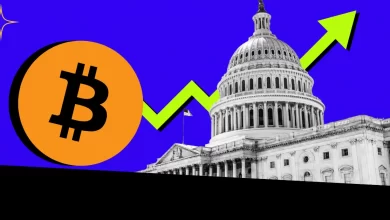
BlackRock's Bitcoin Dominance Sparks Debate: With over 660K BTC under custody, BlackRock now controls half of all ETF-held Bitcoin assets.
Decentralization at Risk: Critics warn ETF Bitcoin strips user control and could let institutions dictate Bitcoin’s future through centralized power.
BlackRock now holds over $70 billion worth of Bitcoin through its ETF products, sparking a heated debate within the crypto community.
While major headlines call it bullish for Bitcoin, critics are calling it something else entirely — a silent Wall Street takeover.
A viral thread by crypto user Leshka.eth on X breaks down how BlackRock’s rising influence may strip Bitcoin of its original purpose: decentralization and financial freedom.
BlackRock Dominates the Bitcoin ETF Market
Recent data shows that the 12 spot Bitcoin ETFs now collectively hold over 1.2 million BTC. Out of this, BlackRock’s iShares Bitcoin Trust (IBIT) alone controls at least 660,137 BTC — over half the ETF market.
That makes IBIT the largest crypto ETF by Bitcoin holdings, contributing significantly to BlackRock’s total $70 billion BTC exposure.
But not everyone is celebrating this as a win.
ETF Bitcoin Isn’t Real Bitcoin, Critics Say
One of the biggest concerns? ETF holders don’t actually own Bitcoin.
All ETF Bitcoin is held in Coinbase Custody, meaning investors do not control the private keys, nor can they transfer, spend, or verify the Bitcoin independently.
Leshka.eth explains this distinction clearly — Bitcoin is now splitting into two paths:
- Sovereign BTC: Held directly by individuals with full control
- ETF BTC: Held by institutions, locked in centralized custody
While Bitcoin ETFs make it easier for traditional investors to gain exposure, they remove user control, undermining Bitcoin’s core principles.
Can BlackRock Shape Bitcoin’s Future?
According to BlackRock’s own iShares Bitcoin Trust filing, the firm can decide which chain to support during a fork. This power could allow them to dictate which version of Bitcoin survives.
In addition, ETF giants like BlackRock could push for:
- OFAC-compliant transactions
- Miner pressure to follow government-friendly policies
- Centralized narratives around Bitcoin use and utility
This raises concerns that Bitcoin’s future could be shaped by politics and finance, rather than code and consensus.
The Real Risk: Bitcoin Becoming Digital Gold 2.0
Leshka.eth draws a parallel to how Wall Street tamed gold. He believes the same could happen to Bitcoin — turning it into a passive, price-driven asset, stripped of purpose and utility.
To prevent this, he urges holders to embrace self-custody — not ETFs.
“Wall Street wants Bitcoin’s brand and price, not its principles,” he warns.
“Hold your private keys. Stay sovereign.”
Never Miss a Beat in the Crypto World!
Stay ahead with breaking news, expert analysis, and real-time updates on the latest trends in Bitcoin, altcoins, DeFi, NFTs, and more.
FAQs
Yes, BlackRock’s ETF prospectus indicates the firm can decide which blockchain fork to support, potentially influencing Bitcoin’s direction.
Trust with CoinPedia:
CoinPedia has been delivering accurate and timely cryptocurrency and blockchain updates since 2017. All content is created by our expert panel of analysts and journalists, following strict Editorial Guidelines based on E-E-A-T (Experience, Expertise, Authoritativeness, Trustworthiness). Every article is fact-checked against reputable sources to ensure accuracy, transparency, and reliability. Our review policy guarantees unbiased evaluations when recommending exchanges, platforms, or tools. We strive to provide timely updates about everything crypto & blockchain, right from startups to industry majors.
Investment Disclaimer:
All opinions and insights shared represent the author's own views on current market conditions. Please do your own research before making investment decisions. Neither the writer nor the publication assumes responsibility for your financial choices.
Sponsored and Advertisements:
Sponsored content and affiliate links may appear on our site. Advertisements are marked clearly, and our editorial content remains entirely independent from our ad partners.








